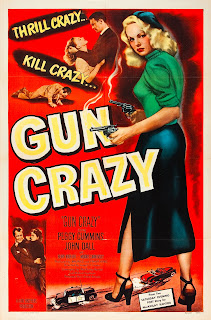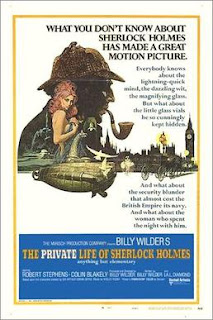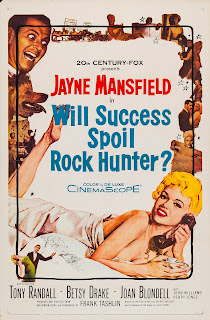Defiant Success
Movies, books, and God knows what else.
Wednesday, January 3, 2024
Gun Crazy
2,000 Posts!
Frankly, I'm surprised to have been going at this for as long as I have, what with Defiant Success's fifteenth (!) anniversary in August.
Admittedly, a good chunk of the posts here aren't reviews but I'm still counting them for the impressive tally of two thousand posts since August 2009. Obviously, I would've made a bigger deal out of it but it slipped my mind and today's something of a somber anniversary for me (it's been eleven years since my father died suddenly). And my blogging has been sporadic these last few years courtesy of current events and my own mental health but I'll try to make up for lost time.
Anyway, here's to 2,000 posts and to another 2.000.
Tuesday, January 2, 2024
Suspiria
Indeed, the general feeling of Suspiria is that something just isn't quite right. And Argento ensures that throughout, be it with the music (courtesy of him and Italian band Goblin) or simply the staging of the scene, there's that lingering sensation that all is not what it seems. And it isn't.
Made during a time when the horror genre was getting (pardon the pun) fresh blood, Suspiria -- amongst his other titles of the time -- showed that Argento was on that roster. Amid the likes of Brian De Palma and John Carpenter, he shows a more lurid fascination with bloodshed. Who'd have thought there's a beauty in it?
Akin to Cat People back in 1942 (and The Brood two years later), Suspiria revels in unease amid normalcy. Everything should be completely fine but that nagging feeling keeps gnawing at our lead. But how long until that question of "what's wrong?" gets cruelly answered?
Suspiria is a barrage on the senses in the best way possible. Argento immortalizes himself with a film that lingers in the mind long after watching it. And it's little wonder that there have been many admirers and imitators over the years; it's just there can only be one version of it.
My Rating: *****
Sunday, December 31, 2023
Film and Book Tally 2023
Saturday, December 31, 2022
Film and Book Tally 2022
Wednesday, January 5, 2022
The Private Life of Sherlock Holmes
Tuesday, January 4, 2022
Winchester '73
Monday, January 3, 2022
Will Success Spoil Rock Hunter?
Frank Tashlin's Will Success Spoil Rock Hunter? -- while deviating from the premise of George Axelrod's original stage play -- is such an example. In the sixty-five years since its release, its satirical portrayal of celebrity and fan culture is all the more prevalent thanks to the advent of social media. (Good thing Tashlin isn't around to see fiction become reality.)
Being a former animator, Tashlin's background is very apparent throughout Will Success Spoil Rock Hunter? With enough visual gags that wouldn't look out of place in your standard cartoon, it shows that he was one of the more unique directors working at the time. It's little wonder that Tashlin was a mentor to Jerry Lewis.
On a similar note, there's enough fourth wall-breaking in Will Success Spoil Rock Hunter? to warrant calling a mason afterwards. Be it towards the stars' private lives or their professional ones, Tashlin's script spares no expense. (Man, comedies from the 1950s were something else, weren't they?)
Will Success Spoil Rock Hunter? starts to lose steam by the third act but Tashlin and the cast make it work nonetheless. Being made when sex comedies were becoming commonplace, it has the distinction of being just a touch classier than later titles. (Faint praise, granted.) Hey, the sexual revolution (and the MPAA's fruition) was only a few years away.
My Rating: ****
Sunday, January 2, 2022
Dragonwyck
By the time Mankiewicz made his directing debut with Dragonwyck, he had been well-established for several years. (He got the gig because original director Ernst Lubitsch fell ill.) And boy, you'd never know this was his first time directing as you watch it. (Granted, he also co-wrote the script so already he had an idea of how the film flowed.)
Bearing elements reminiscent of Rebecca six years earlier, Dragonwyck is the kind of film that Hollywood -- barring Crimson Peak, perhaps -- doesn't make anymore. And that's a shame, really; it's a genre that has a little bit of everything (with more focus on some elements than others) and it's a solid deviation of the standard romance. (Because -- let's be honest -- romance itself is more complex than what Hollywood has us believe.)
Having more screentime together here than in their previous collaborations (Laura and Leave Her to Heaven), Gene Tierney and Vincent Price have excellent chemistry together. And Price -- after years of bit parts and supporting roles -- finally has a meaty role to sink his teeth into. (It was originally going to be Gregory Peck but he dropped out after Lubitsch did.) Makes you wonder had he gotten more roles like this throughout his career.
Dragonwyck is one of those few directorial debuts that works after all these years. With stunning cinematography by Arthur C. Miller and a chilling score from Arthur Newman, it just proves that Hollywood has been playing it safe for too long. Take more risks, Hollywood, like you did before the MPAA came to fruition.
My Rating: ****1/2
Friday, December 31, 2021
Film and Book Tally 2021
Well, this year of viewings and readings was slowed down a bit by me wanting to focus more on fiction writing (as well as helping out around the house). Still, I manage to squeeze some time in for these. Anyway, you know the drill. (Heads up: it's not an impressive list.)





